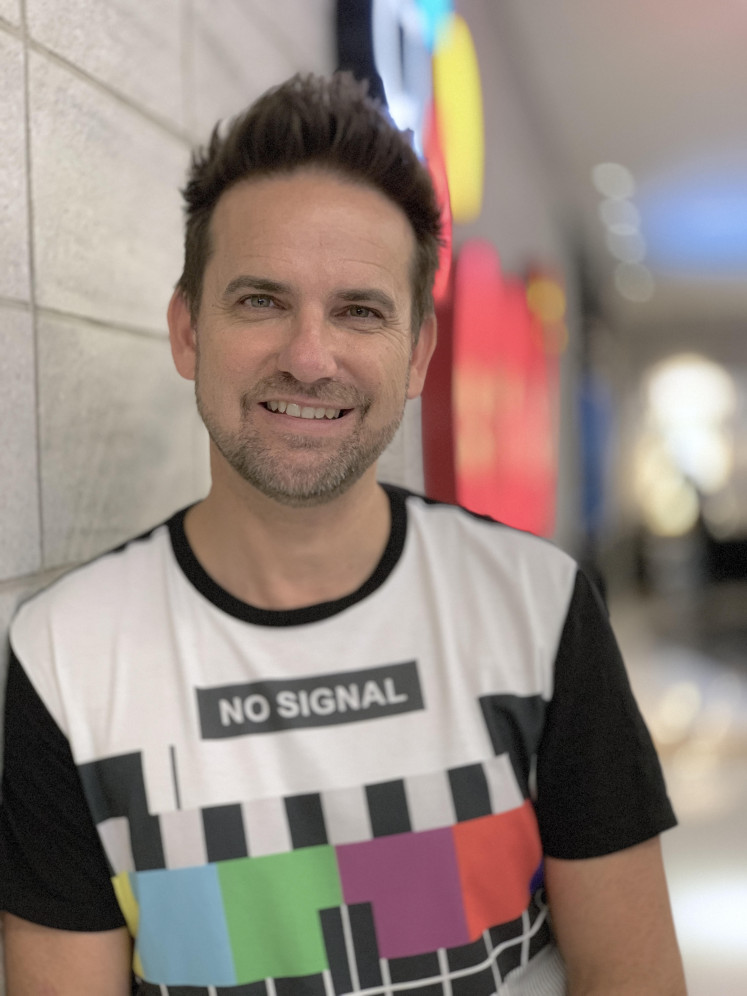Popular Reads
Top Results
Can't find what you're looking for?
View all search resultsPopular Reads
Top Results
Can't find what you're looking for?
View all search resultsFilmmaker? Jason van Genderen is a 'filmbreaker'
Change text size
Gift Premium Articles
to Anyone
J
ason van Genderen is an award-winning “filmbreaker” on a mission to shatter the glass ceiling of the film industry by inspiring others to do the same.
Until recently, Jason, as he likes to be addressed, owned 12 iPhones. That was before he traded some in and now has in his possession a measly six.
Rather than someone with an unhealthy addiction to Instagram, he is a “filmbreaker” – a storyteller who tears apart the traditional format of filmmaking by using smartphones to tell intimate and spontaneous stories.
Jason has created award-winning documentaries using only the iPhone in his pocket, a few pint-sized gadgets and some nifty apps.
In Jakarta for a two-day workshop called Script to Screen and hosted by the Motion Picture Association (MPA), Jason shared with an audience of budding filmmakers his tips and tricks for affordable filmmaking to help more local movies make it to screens of the world.
Jakarta producer Fauzan Zidni, director Agung Sentausa and screenwriter E. S. Ito also took to the stage to discuss the importance of forums for filmmakers to pitch their ideas and seek funding.
Groundbreaking: Shot in 2008 on what is now considered a prehistoric Nokia N95 slider phone, 'Mankind Is No Island' cost just AUS$57 (US$40.69) to make and went on to gross over AUS$33,000. (Courtesy of Jason van Genderen/-)Shot in 2008 on what is now considered a prehistoric Nokia N95 slider phone, Jason’s first film, Mankind Is No Island, cost just AUS$57 (US$40.69) to make and went on to gross over AUS$33,000.
“It was really a dare more for myself. It was an experimental moment of understanding that finally you actually have not only a camera on [the phone] for stills but also a video mode for shooting film,” he told The Jakarta Post.
Shot in New York and Sydney, Mankind Is No Island draws attention to people sleeping on the streets of these beloved cities. The filmmaking process was not an easy one, and alongside problems of how to get the footage from the Nokia onto a computer – Bluetooth – and how to tell a story with 13,000 words – the film very nearly disappeared.
“I left my bag hanging on the back of a luggage trolley at a Sydney airport and drove two hours home before I realized […] that was the only copy of the film, on that laptop.” Thankfully, someone had handed the bag in.
After the success of Mankind Is No Island, Jason turned his back on traditional filmmaking for good.
Putting it into practice. Jason van Genderen poses at The Script to Screen workshop, Jakarta. Photo taken using an iPhone X then edited with the Focos app. (The Jakarta Post/Evie Breese)He has since created multiple short documentaries filmed entirely on an iPhone, and his commercial production agency, Treehouse Creative, is one of the first worldwide to physically downsize their filming tools exclusively to – you guessed it – iPhones.
The real attraction of smartphone filming for Jason is a practical one: You’ve got your phone in your pocket, so you’re always ready to film.
His short film The Missing Things (released in 2018) tells a heartwarming story of dementia starting to steal memories from his mother, Hendrika.
Window to the soul: A still from Jason van Genderen’s short film ‘The Missing Things’ (2018) about his mother's battle with dementia shows her moving from her home to her son’s. The film was shot entirely on iPhone. (Courtesy of Jason van Genderen/-)Jason never set out to make a film of this journey but simply began filming snippets of his mother to document her transition. Such intimate moments could never have been captured with a film crew or sound technician dangling a “dead cat” microphone overhead.
Explaining why he chose to make films about such personal and affecting topics as his mother’s dementia, Jason divulged: “I’m a hyper-emotional soul […]. I’m always affected by key life chapters, and for me that’s probably what attracted me to thinking about cameras that are with us all the time.”
Jason is no longer a black sheep in the film industry. More and more big name producers and directors opt for the humble smartphone as their tool of choice.
Independent filmmaker Steven Soderbergh recently released his first feature-length horror film Unsane (2018), shot exclusively on iPhone.
The effect this movement could have on the industry should not be underestimated. Jason calls this process the “democratization of filmmaking”, describing how anyone with a camera phone has the tools to make an award-winning film.
Rance Pow, CEO of film industry consulting firm Artisan Gateway, who also spoke at the event, divulged on the “filmbreaker” trend as an exciting time for the industry. “It means there are more voices, and people are coming without baggage [...]. The next Steven Spielberg or Christopher Nolan or James Cameron could very well be filming [their] first film on a phone right now.”
Not content with just focusing on his own filmmaking, Jason is on a mission to inspire others to take their phone out of their pocket and start filming. Jason realized that by introducing himself as a “filmmaker”, certain expectations would be placed on him and his films.
To combat this, he coined the term “filmbreaker” to denote that he was doing something unconventional, something breaking boundaries.
The movement is now well underway, its Facebook group counting more than 30,000 members armed with smartphones and looking for their next story.
Imparting his wisdom to the next generation, Jason said the only way of discovering what you could achieve as a storyteller was to go for it. “Don’t be hung up by the tools; the world’s greatest chefs aren’t judged by what brand of knife [they use].”
Give it a go: Tips and tricks from Jason
- Play around with angles, background texture and lighting. Camera phones are small enough to get in close and experiment.
- Have a go at “lean-forward filmmaking”, whereby you allow the camera to show you interesting perspectives rather than following a preplanned schedule.
- Download some apps. These are great for refining your footage or photos in post-production. Jason recommends the Focos app, which enables a bokeh effect -- blurring the background of a shot.
- Always be ready. Keep your phone close to hand – even in your pocket – and film anything and everything that sparks your interest. You never know how you might end up using it. (ste)
-- The writer is an intern at The Jakarta Post.














